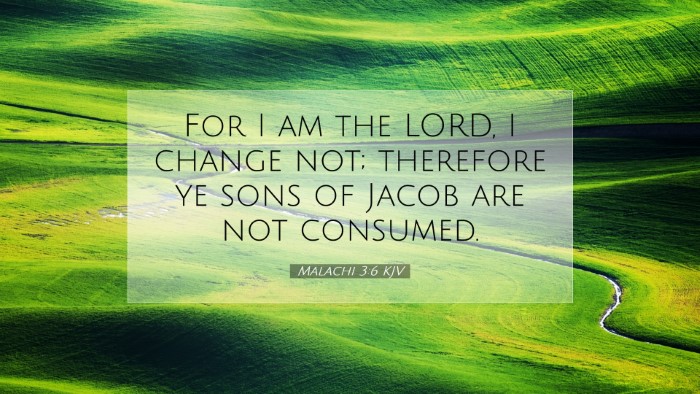Old Testament
Genesis Exodus Leviticus Numbers Deuteronomy Joshua Judges Ruth 1 Samuel 2 Samuel 1 Kings 2 Kings 1 Chronicles 2 Chronicles Ezra Nehemiah Esther Job Psalms Proverbs Ecclesiastes Song of Solomon Isaiah Jeremiah Lamentations Ezekiel Daniel Hosea Joel Amos Obadiah Jonah Micah Nahum Habakkuk Zephaniah Haggai Zechariah MalachiMalachi 3:6
Malachi 3:6 KJV
For I am the LORD, I change not; therefore ye sons of Jacob are not consumed.
Malachi 3:6 Bible Commentary
Commentary on Malachi 3:6
Verse: "For I am the Lord, I change not; therefore ye sons of Jacob are not consumed."
Introduction
The message in Malachi 3:6 encapsulates a profound theological truth about the immutability of God. This commentary seeks to explore both the contextual and theological implications of the verse, drawing insights from esteemed public domain commentaries. Understanding Malachi 3:6 is crucial for pastors, students, and theologians as they unravel the depth of God's character and His covenantal faithfulness to His people.
Contextual Background
Malachi, the last book in the Old Testament, was written during a time of spiritual decline among the Israelites post-exile. The priests had become negligent in their duties, and the people's worship was marked by indifference and hypocrisy. Against this backdrop, Malachi serves as a divine messenger, calling the people to return to the Lord.
The Unchanging Nature of God
1. Theological Significance of God's Immutability
Matthew Henry remarks that the phrase "I change not" emphasizes God's steadfastness. Unlike humanity, God does not undergo change in His nature or purpose. This unchangeable character is a source of comfort for believers, as it assures them of His continual fidelity and commitment to His promises.
2. Assurance for the People
Albert Barnes points out that the assurance of God's unchanging nature serves as a foundation for the hope of Israel. Although they have faltered in their faithfulness, their survival is attributed to God's unwavering character. The sons of Jacob, despite their failings, are not consumed, signaling that God's mercy prevails despite their sins.
Historical Reflections
Adam Clarke adds historical context by noting that the sons of Jacob represent the covenant people of God, Israel. Their preservation through various trials showcases God's grace. Clarke emphasizes that God's covenant with His people is not nullified by their shortcomings; rather, it reveals His unwavering commitment to them.
Applications for Modern Believers
1. Hope Amid Troubles
The unchanging nature of God serves as a beacon of hope in turbulent times. As believers navigate life's uncertainties, they can trust in the consistent nature of God’s promises. His nature assures that He remains a refuge and strength amidst life's storms.
2. Call to Faithfulness
This verse calls believers to reflect on their commitments. Just as God remains faithful, so too must His people strive for steadfastness in their relationship with Him. Reflecting on God’s immutability encourages a deeper commitment to living according to His will.
Interpretive Insights
- God’s Sovereignty: The assertion "I am the Lord" denotes His supreme authority, which is not subject to human whims or societal changes.
- Continuity of God's Character: This verse encapsulates the promise of God’s presence and involvement in the history of His people.
- Covenantal Relationship: The mention of the sons of Jacob highlights the election and covenant relationship that God has established, serving as a reminder of His sovereign grace.
Theological Reflections
1. Doctrine of God:
Understanding God's immutability is crucial for any theological discourse. It challenges contemporary perspectives that may attribute changeability to the divine. As Clarke notes, God's essence is unchanged by time, culture, or human behavior.
2. Eschatological Implications:
Matthew Henry suggests that God’s unchanging nature serves as a forewarning of impending judgment. As God maintains His promises, He will also fulfill His declarations regarding sin and righteousness. This notion provides a sober reminder of accountability in the light of God's immutable justice.
Conclusion
Malachi 3:6 is crucial for understanding the character of God and the nature of His relationship with humanity. By grounding faith in the immutability of God, believers can find comfort, assurance, and a call to steadfastness in a world that often embodies change. As we reflect on this verse, may we be inspired to grow in our commitment to the One who is unchanging and eternally faithful.


